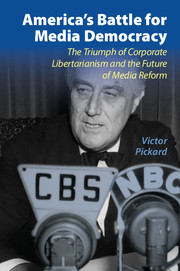 America's Battle for Media Democracy
America's Battle for Media Democracy Book contents
- Frontmatter
- Contents
- Acknowledgments
- Introduction
- 1 The Revolt against Radio
- 2 A Progressive Turn at the FCC
- 3 The Battle of the Blue Book
- 4 The Origins of the Fairness Doctrine
- 5 The 1940s Newspaper Crisis and the Birth of the Hutchins Commission
- 6 Should the Giants Be Slain or Persuaded to Be Good?
- 7 The Postwar Settlement for American Media
- Conclusion
- Bibliography of Primary Sources
- Index
- References
7 - The Postwar Settlement for American Media
Published online by Cambridge University Press: 05 October 2014
- Frontmatter
- Contents
- Acknowledgments
- Introduction
- 1 The Revolt against Radio
- 2 A Progressive Turn at the FCC
- 3 The Battle of the Blue Book
- 4 The Origins of the Fairness Doctrine
- 5 The 1940s Newspaper Crisis and the Birth of the Hutchins Commission
- 6 Should the Giants Be Slain or Persuaded to Be Good?
- 7 The Postwar Settlement for American Media
- Conclusion
- Bibliography of Primary Sources
- Index
- References
Summary
Key normative foundations underlying the American media system – and assumptions about government’s role in maintaining them – crystallized during a brief yet dynamic period in the 1940s, a critical juncture when technological, social, and political upheavals created crisis and opportunity. A number of potential trajectories opened before policy makers during fundamental debates about the relationships among media institutions, the state, and various publics. What did broadcasters and publishers owe the public? What were media institutions’ public service responsibilities? And what was government’s regulatory role in enforcing them? Progressive ideas flourished for a time. But as the decade progressed, America witnessed a narrowing of discursive parameters, setting limitations on the potential for government intervention against commercial media. Once this window closed, structural reforms were increasingly off-limits. Commercial broadcasters could feel confident that their licenses would not be revoked regardless of poor public service, and antitrust action against newspaper monopolies ceased to be a serious threat. This era’s policy battles resulted in a settlement that media would be self-regulated but “socially responsible” – an industry-friendly arrangement that enshrined a negative conception of press freedom while mandating largely nominal concessions to the public interest.
This outcome is consistent with policy discourses and normative expectations associated with corporate libertarianism, an ideology that conflates corporate privilege with First Amendment freedoms and is girded by a logic that advances individualistic negative liberties at the expense of the collective positive liberties that are central to a social democratic vision of media. Similar to the political economic shifts sketched in Michael Denning’s The Cultural Front – which described a failed social democratic challenge in 1940s America that resulted in a power share among labor unions, government, and big business – this transitional moment marked the Popular Front’s dissolution, giving way to a more accommodationist liberalism. For media institutions, the postwar settlement emerging from the resolutions of 1940s policy debates signaled a deregulatory turn – or rather, a “reregulation” under oligopolistic markets. This arrangement systematically obscured structural critiques, foreclosed radical alternatives, and pushed back against social democratic reform movements. In doing so, it kept in place a self-regulating, nominally socially responsible commercial media system.
- Type
- Chapter
- Information
- America's Battle for Media DemocracyThe Triumph of Corporate Libertarianism and the Future of Media Reform, pp. 190 - 211Publisher: Cambridge University PressPrint publication year: 2014


